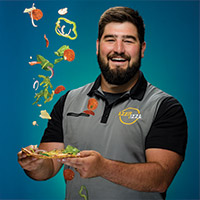Build a Healthier Society
College-wide initiative to focus on collaborative research and diverse learning opportunities
Purdue's earliest discussions of what a new College of Health and Human Sciences might look like included the need for a world-class university to address the critical needs of public health — to translate cutting-edge research into impactful outcomes for diverse communities, foster collaborations in pursuit of discoveries, and provide like- minded students with academic options and career paths for improving all aspects of the health care system. The college, now in its sixth year, is answering that call with the Public Health Graduate Program (PHGP) and interdisciplinary research on health care disparities.
A public health graduate degree is not new to Purdue. Originally housed in Health and Kinesiology, the program began in 2006 and matriculated its first graduates in 2007. There are many successful Boilermaker alumni with a master's degree in public health (MPH) working within the field. The college-wide initiative will expand on the training options for current and future students who pursue the degree.
Rick Mattes, Distinguished Professor of Nutrition Science and PHGP director, recalls those strategic planning sessions about the possibilities of the revamped program. "Many of the units in the new college had a health orientation," he says. "Each also had a credentialed professional, like a registered dietitian, a licensed practical nurse or a clinical psychologist. And, of course, we all had scholars generating basic knowledge in each of our own disciplines. So we were really ideally positioned for translational science — to move basic knowledge to the community."
Mattes began as director in July 2014 and the program transitioned to the college the following November. For Mattes, the opportunity to promote science-based recommendations to community needs is at the heart of the matter of public health. "The thinking was that public health would be a unifying theme, linking all of the units in the new college," he says. "So the plan now is to grow it."

The next step is seeking accreditation, which won't happen overnight, Mattes says. In all, it's about a three-year process. However, enrollment already has increased in the program, which offers three tracks. One is a combined degree, allowing undergrads to obtain both a bachelor's and master's at an accelerated pace — often referred to as a "4 +1" program. Highly qualified students can apply in their junior year, and if accepted, take a mix of senior-level and graduate courses in their fourth year. After a summer practicum, the students will complete their MPH work in a fifth year. That fast track effectively saves them one year while earning two degrees.
Students pursuing a bachelor's degree in the Purdue Public Health Undergraduate Program (PHUP) will have the option of earning the standalone MPH in a straightforward two-year program. Another option provides an opportunity for admitted graduate students to pursue dual degrees and earn a MPH concurrently with a master's in science or PhD from another area. Students on this track are expected to require one to two additional semesters. All three tracks are proving popular, generating numerous inquiries and applications.
When people comment on how fat tastes, they often describe tactile sensations such as creaminess or viscosity. Consider how drinking whole milk versus skim milk feels. Though not often associated with fat, the strong odor of some foods such as ripe cheese also is derived from fats. But Mattes has conducted an array of studies that indicate there also is a taste component to fat, or more specifically the fatty acids that makeup dietary fat. These studies focus not only on the sensations detected in the mouth, but also how the body responds physiologically to oral fat exposure. For example, when fat is being tasted it triggers a rapid and sustained elevation of blood lipids (triglycerides) linking taste to metabolism and possibly chronic disease risk. The odor and texture cues from fat are not as effective as taste for driving these kinds of responses. Moreover, these responses differ in lean and obese individuals, he says. To better understand these mechanisms, Mattes is looking at the role genetics play in the taste of fat.
In helping to orchestrate the accreditation, Mattes is working with faculty and administrators to ensure that the emerging program's quality meets or exceeds national standards for the field. "Once we achieve that milestone, we'll be able to attract the top students throughout the nation and internationally," says Mattes, who points to the international representation and solid reputation already associated with the program.
Shauna Stapleton, who earned a Purdue MPH degree in 2013, serves as the PHGP coordinator. About half of her time is spent identifying and coordinating the practicum experiences for students, who are required to have 400 hours of work in a public health setting. She's also an academic counselor for students and has been integral to the accreditation process.
Her own path to the MPH degree reflects how younger people can learn about the larger issues of public health. "As a Purdue undergrad, I was interested in health and science," says Stapleton, who earned a BS in entomology in 2009. "I was introduced to the world of public health as a senior in a medical and veterinary entomology course. I realized medical care was only one small component of healthy communities."
After graduation, a two-year teaching stint in Teach for America opened her eyes to major health disparities associated with urban America. The return to Purdue to pursue the advanced degree changed both her outlook and career path. "Combining my scientific background, passion and experience has led to a promising and impactful career," she says.
PHGP students will choose from three concentrations. Family and Community Health will draw from the Department of Human Development and Family Studies for the first concentration, as well as Purdue's robust Extension Service and he Center for Families, and the Military Family Research Institute. A second concentration in Environmental Health will dovetail with the college's School of Health Sciences, the Department of Entomology and several disciplines from the College of Engineering that have an ecological focus. Finally, Health Statistics will benefit from a close tie to the Department of Statistics and faculty across campus with expertise in epidemiology and information technology.











